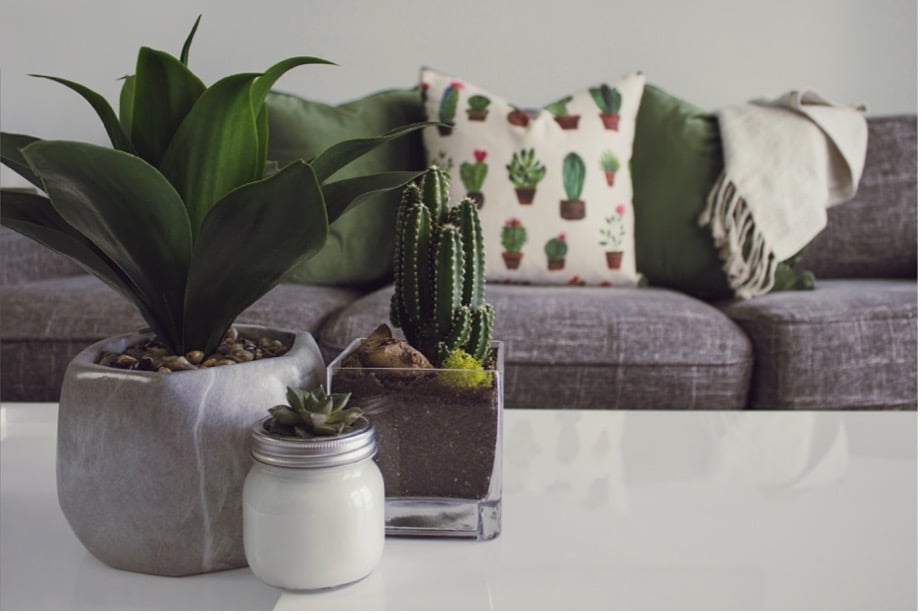What is biophilic design? The benefits of being in nature, explored in the home

Our inspirational gardening expert, Mark Lane, praises the mental benefits of Biophilia. The physical and mental health benefits of spending time in nature are endless. Here, Mark explains how we can benefit from bringing the outdoors in.
World Health Organisation reported that more than five in 10 of the world’s population live in urban areas. Over the last 50 years, the percentage of the population living in urban spaces has increased by 20%, and that is set to continue to grow as our world becomes more developed, but we are beginning to understand how and why we can get so much peace and wellbeing from nature, and how it can improve our own lives.
Growing to acknowledge Biophilia
With more of us now living in an ‘urban’ environment, we are reducing our access to wildlife and our engagement with nature on a personal level, limiting its ability to offer us restoration or, more simply, offering us an escape from our daily stresses.
Many of us in urban environments do, however, seek out the world and the spaces in which nature can be accessed through parks, gardens, or getting out to the countryside, as more of us are finding the pressures of the modern world too much.
We have long held the belief that being in outdoor environments and connecting to the natural world has a positive effect on us, whether this be biological, in reducing stress responses and lowering blood pressure, or emotional, reducing the effects of depression or anxiety, or simply making us feel more able to cope with the daily challenges that we are meeting as part of our modern lives. Proving this has always been tricky, but research is continuously being published on this subject.
One of the main pieces of theory we often refer to when considering the positive effect nature has on ourselves is Biophilia, a term first used in 1973 and a paper by a Harvard scientist in 1984. It noted that:
‘peaceful or nurturing elements of nature, helped us regain equanimity, cognitive clarity, empathy and hope.’
In effect, nature helps us regain composure, calmness, and clarity of thought, along with regaining our empathy and hope.
It was also noted that those of us that were most attuned to the cues from nature were the ones who survived to pass on those traits. In other words, we evolved in nature, so we are evolutionarily linked to nature and its effect on us and subsequent generations.
Biophilia is, therefore, one of the critical pieces of theory we use when discussing the positive and restorative effect nature can have on us. There is an innately emotional connection of human beings to other living things. Biophilia is a theory that helps us understand how people are motivated to interact with nature and gardening and gain healing benefits. The term ‘Restoration’ is often used when referring to Biophilia. It is the idea that we’re ‘healed’ or can ‘recover’ after spending time in nature. We can all relate to the calming feeling we get when we walk through a park or woodland or spend some time in nature – this is restoration.
The physical and mental health benefits of being in nature
Going for a walk in a forest, or forest bathing, results in decreased cortisol levels, sympathetic nerve activity (our flight or fight response), blood pressure and heart rate.
Getting our bare hands into the natural elements like soil is good for our mental wellbeing too. There are beneficial bacteria in soil called Mycobacterium vaccae which trigger the release of serotonin and endorphins in our brain, which are happy chemicals, a natural anti-depressant and strengthen the immune system. So, ideally, don’t wear gloves when gardening.

Incorporating biophilic design in the home
Bringing nature into our homes by introducing houseplants has a biophilic effect on us. Group together plants to create lush compositions, especially in areas where you sit and relax. Looking at something green, such as a houseplant, will help slow our heart rates, make us feel more relaxed, and help lift anxiety and depression while contributing to better air quality.
Living walls, both inside and outside, are a great way to green up our living environments and make us feel better. There are many off-the-shelf products that you can use. The products that are predominantly gaps/holes where a potted plant can be inserted are great because if the plant dies, you can swap it out for a new healthy plant. Remember that greening a wall can help lower energy bills throughout the winter as they act as additional wall insulation. Choose plants that flower and those with verdant leaves, and you can start to escape the daily stresses by enjoying your little bit of nature in your outdoor space.
Learn more about the mechanism of the air purifying power of plants — and the best blooms for every room of the home, to incorporate the principles of biophilic design and boost your physical and mental health.
Stay up to date
Latest Blogs

Whole Home Comfort with Stannah and HSL

Dame Zandra Rhodes x Stannah: When accessibility meets style
Could more people benefit from home adaptation support for hidden disabilities?
50 years of Stannah Stairlifts – A milestone grounded in purpose

BBC’s Dr Punam Krishan reveals a little-known Parkinson’s symptom to watch for...

Are you at risk of falling? Dr. Punam Krishan’s simple 12-second test could tell you...

Snore Wars: Could sleeping separately be the secret to a better night’s rest?

Proud to carry the Made in Britain mark!
Stairlifts made for you
All our stairlifts whether straight or curved are customised to suit you and your home so call now to arrange a visit to get your FREE personalised quote!